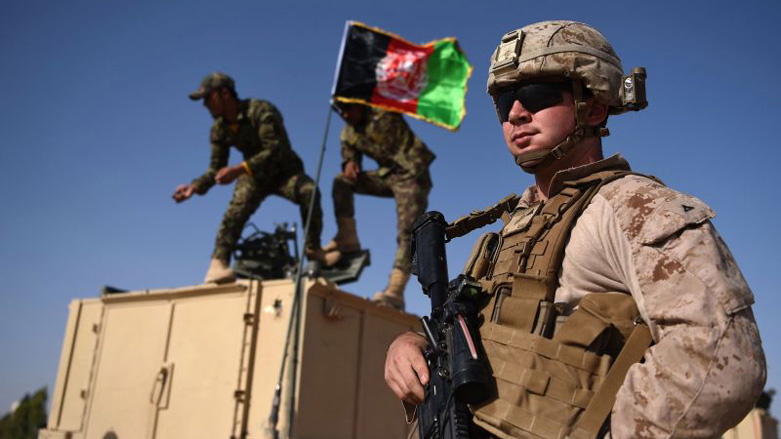US agreement with Taliban holds for first day, as it aims at broader Afghan cease-fire

WASHINGTON DC (Kurdistan 24) On Friday, US Secretary of State Mike Pompeo issued a statement announcing that Washington had reached an agreement with the Taliban for a “significant and nationwide reduction in violence across Afghanistan.”
The agreement took effect at midnight Friday, local time, and the US commander in Afghanistan, Gen. Austin (“Scott”) Miller informed reporters in Kabul, “Our operations are defensive at this point. We stopped our offensive operations as part of our obligations, but we remain committed to defend our forces.”
The first day of the US-Taliban accord passed without incident. The reduction in violence is to last a week—in essence, a testing period. If it proves successful, a formal agreement is to be signed on Saturday, Feb. 29, between the US and the Taliban.
Qatar has long hosted a Taliban office, and much of the negotiations with the Taliban took place in Doha. The signing ceremony for the formal agreement is to be held there, on the assumption that the ceasefire holds.
The preliminary agreement announced on Friday paves the way for a “political settlement to end the war in Afghanistan,” Pompeo stated.
NATO Secretary General Jens Stoltenberg welcomed the agreement, describing it as “a critical test of the Taliban’s willingness and ability to reduce violence, and contribute to peace in good faith.”
US objectives in Afghanistan
Pompeo’s statement also explained that the US seeks to achieve two other basic objectives through the agreement with the Taliban. One is to reduce the numbers of US and allied forces in Afghanistan, and the other is to “ensure that no terrorist group ever uses Afghan soil to threaten the United States or our allies.”
The US-led war in Afghanistan, launched by President George W. Bush in the wake of the Sept. 11, 2001, attacks, has become America’s longest war, and it has grown unpopular with the US public.
However, the prospect of this problem was not recognized at the time, such was the overwhelming sense of confidence among Americans a decade after the collapse of the Soviet Union. In the wake of the 9/11 attacks, many pundits called for a “long war,” while one, prominently, even called for “World War IV!”
Indeed, just two months after the US intervention in Afghanistan began, the Bush administration believed it had won the war there. That view was not some glossy White House spin on a difficult situation, but what the US military (and, presumably, other agencies) were reporting.
Reducing US and NATO Forces in Afghanistan
Now, 19 years later, the US is still fighting in Afghanistan. Some 14,000 US troops are deployed there, while NATO has another 17,000 forces, which come from 39 alliance members and partner countries. The Trump administration aims to reduce that significantly, with US officials suggesting American forces could be reduced to 8,600.
Yet that still represents a significant number of US troops—greater than the approximately 6,000 troops deployed to Iraq and Syria to combat the so-called Islamic State.
After the anticipated Feb. 29 signing of the accord, negotiations between the Afghan government and the Taliban are to start, with the aim of delivering “a comprehensive and permanent ceasefire and the future political roadmap for Afghanistan,” Pompeo explained.
Achieving such an intra-Afghan agreement is likely to be the most difficult step in the process, and success is far from guaranteed. Yet it is not hopeless.
Pakistan has been a major backer of the Taliban for the past two decades. In fact, the Taliban first took power in Kabul in 1996 with the support of Pakistan, and Pakistan continues to back the group.
Islamabad has welcomed the US accord with the Taliban. "From the outset, Pakistan has facilitated this process and contributed to its progress thus far,” its Foreign Ministry said on Friday. “We look forward to the signing of the agreement on February 29, 2020.”
An understanding between the US and Pakistan may well prove the key to reaching an accord between the Afghan parties. Just as the Afghan government is heavily dependent on Washington’s support, the Taliban are dependent on Islamabad.
Holding Pakistan Accountable
Unlike the Bush and Obama administrations, the Trump administration recognized Pakistan’s crucial role in supporting the Taliban and began to demonstrate, concretely, that it was unacceptable.
Already in 2018, the Trump administration cancelled $800 million in military aid to Pakistan for its support of the Taliban. That contrasts with the two previous US administrations, which took no such decisive measures.
Indeed, this reporter worked in Afghanistan as a cultural advisor to the US military during the Obama years, and it almost seemed that Islamabad held the upper hand. US forces used Pakistan as a supply route, and when the US did something that Islamabad did not like, it blocked supplies.
We used to joke that for every day the Pakistanis withheld supplies, including our food, Washington should withhold its own aid to that country.
The Trump administration, thus, acted along the lines that troops in the field recognized as necessary years ago, and it now may well be in a position to reap the gains.
Editing by John J. Catherine
